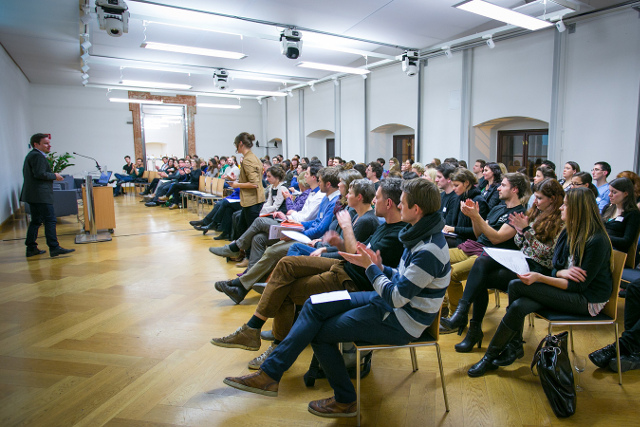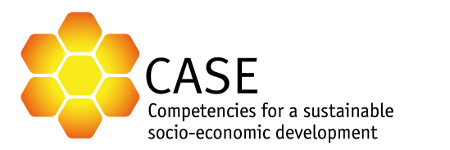 What is it about?
What is it about?

The invitation of experts as guest lecturers offers students the opportunity to meet passionate, committed and critical people and to learn from them in various ways. Guest lecturers provide an important educational experience for students based on their real-world life experiences. Students get to see the insight and perspective of the guest lecturers’ specific field. The format can enable students to interact with professionals in formal and informal settings. Through discussions, interpersonal competence and communicative skills are fostered. Guests’ contributions can take the format of a single lecture, a lecture series over a specific period or workshops.
Another benefit is the link that students get to make between what they learn in their textbooks and the experiences shared by the guest speaker. Students thereby build important connections between what they have learned and the real world.
Guest lecturers can act as role models and bring an authentic, vivid picture of the real world to students, thereby enabling transdisciplinary learning. Experiences and perspectives from local actors and entrepreneurs inspire students in their own (entrepreneurial) projects, creating motivation and an action-orientation. They bring in special expertise and experiences that teachers cannot provide. The extent to which guest lecturers’ inputs are valuable depends however on the guests’ personal skills (e.g. as a speaker), their experience and personality.
Depending on the overall design of the course, the framework of integration including the selection criteria of guests is set. A choice of people based on personal contacts of the teacher works fast but can be limiting. A mix of proven and new lecturers is recommendable to bridge this gap.
Careful preparation of the setting is required to use the full potential of this format despite its relative simplicity. An extensive briefing of guest lecturers is key to clarify expectations and set a fruitful frame for the corporation. A more profound approach would let the guest lecturers participate already in the design process of the course.
Ideally, students prepare for each guest lecture by doing some selected readings. To make optimal use of practitioners’ knowledge and experience, guest lecturers can be asked to give feedback on student work. This should be communicated in advance and sufficient time must be reserved.
The exchange between the students and the external guests can be further fostered through a dedicated space for a vital discussion. Relevant questions should be prepared by the students beforehand, especially when they are asked out of a critical point of view.
After the visit of the guest lecturer, time for reflection helps to link back to the academic perspective of the course topic.
Ethical and local economy
The goal of this course is to foster students’ knowledge about practical models, solutions, and approaches in the field of ecological economics as well as their contextualization in terms of ecological economics and other current streams of thought. The guest speakers presented alternatives such as car-sharing, a business cooperative managing hospitality and catering facilities, and a Hub (accelerator) for social enterprise. The students were asked to read and comment some texts before each guest presentation to become more familiar with the related theoretical framework. The texts formed the basis for discussions in class. Students were encouraged to participate actively and to discuss the topics with the guests.
Sustainable Development in the Oldenburger Münsterland: solving problems with innovative projects
This course focused on new ideas and strategies about how our society can live and organize itself in the light of social and environmental challenges. Following the idea of entrepreneurship learning, the course strengthened the cooperation with local actors and gave students the chance to develop a project as a local entrepreneurial change maker to enhance sustainability in the region.
Change-Management: Shaping a sustainable world by innovation, participation and leadership
In this course students had a look into key elements and concepts of change management in society and business. Guest lecturers from business, NGOs and other Universities created an atmosphere of exchange, discussion and learning. The students’ projects illustrated a variety of change processes – individual ones, focused on personality as well as public, participatory events like the “Courage in the City Walk”. Find out more about the course Change-Management
Teamwork
Teamwork is an essential component of most professional activities. This course is an introduction to teamwork skills for future social agents that will help students to improve their own work performance. It covers why teams are important, the roles of individuals in a team, systems and processes for effective teamwork and communication, and methods for addressing team conflict. Throughout the course, experts with different working experience are invited in order to allow students to get a very concrete insight into everyday working routines. More detailed italien description of the course
 Benefits
Benefits
- Improve the ability to think critically
- Students linking own ideas directly to the input of practice actors
- Guest lecturers get in touch with young, motivated people
- Personal contact with teachers appreciated by guests
- Practical knowledge transfer to younger generation
 Success factors
Success factors
- Minimized bureaucracy according to formats’ low complexity
- Interactive elements encouraging students to actively participate
- Availability of guest lecturer(s) for feedback, questions and discussion
- Flexibility of teacher concerning the needs of the guest(s)
 Challenges
Challenges
- Avoiding overlap in the guests’ contribution to a topic
- Balanced division of time for input and discussion
- The guest lecturers’ availability for students before and/or after the course unit
- Teacher should be prepared for intervening if necessary
 Supporting material
Supporting material
General overview
Tools
 Contacts and experts
Contacts and experts
- Julia Buchebner, University of Natural Resources and Life Sciences, Vienna, Austria
- Christian Rammel, Vienna University of Economics and Business, Austria

 Phase 1 – Planning
Phase 1 – Planning
 Phase 2 – Preparation
Phase 2 – Preparation
 Phase 3 – Guest lecture unit
Phase 3 – Guest lecture unit
